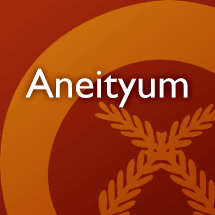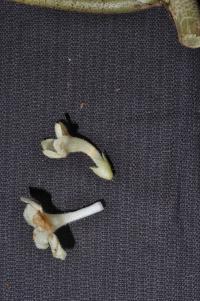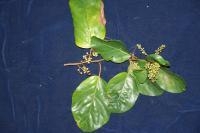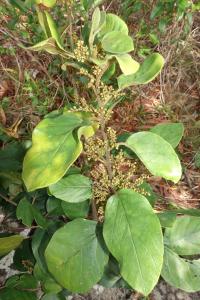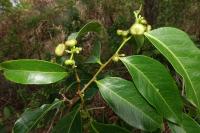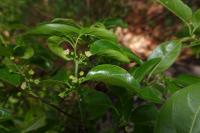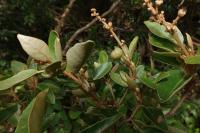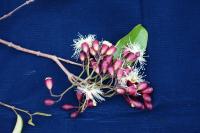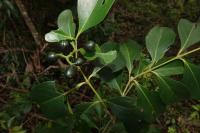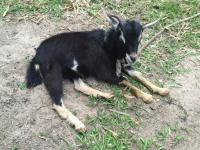This page has returned 100 entries
naledmot

naledpen
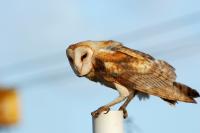
nalgaij
n. kind of sugarcane; also "inhelegaij"
bookmarknalgaj
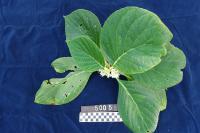
nalgaj
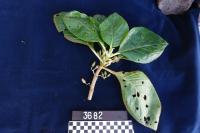
n. small treelet, 1 m tall (collection: Gregory M. Plunkett #3682)
Example: Can be used to stop pain from toothache. Break of the top growth of a branch and remove all leaves. Chew on the green stem at the site where there is a toothache. Keep the juice from chewing in your mouth for 2-5 minutes then spit the juice out. Leave the stem fibers in your mouth at the site of pain for about 20 minutes then remove. Then repeat 2 more times. This makes the tooth thinner so it breaks more easily.
bookmarknaligaj
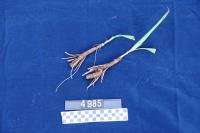
n. herb to 10 cm, sterile (collection: Michael J. Balick #4985)
Example: This plant is a very important food during a famine. People dig up the roots and roast these on the embers of a fire for 25 minutes, then check the root to get out the starchy material, and spit out the fiber. There is said to be little taste; this is a bland food that a person eats to survive. People on Aneityum have harvested it for a very long time so there is not as much of a supply left as in the past.
bookmarknälmaha
n. Ficus septica var. cauliflora
bookmarknälmaha
n. unidentified species
Example: Fresh leaves: special Kastom ceremony used to treat severe abdominal pain during pregnancy
bookmarknalmupeñ
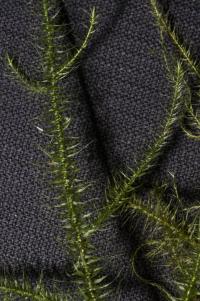
nalvara
n. the beginning of cold wind
bookmarknalvi pece
n. isle, island
bookmarknalvimtinjap
n. a light wind; the beginning of a wind
bookmarknama u niprij
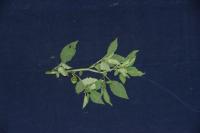
n. herb, growing along garden area. Flowers yellow. (collection: Gregory M. Plunkett #3595)
Example: 1. As a medicine for dengue fever, take a handful of stem apices of this plant, boil in 1-2 cups of water and drink this amount 3x daily, cold, until the fever goes away. This treatment is said to give a person strength during the course of the illness. 2. Take top branch – 2 leaves and put under baby’s pillow, baby will fall into a deep sleep.
bookmarknamaj
n. kind of taro
bookmarknamaka
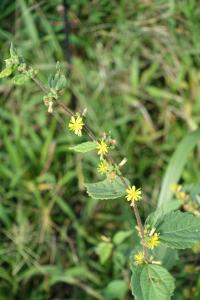
namaka
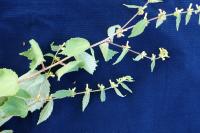
n. herb to 1 m,flowers yellow. (collection: Michael J. Balick #4893)
Example: To make rope, cut the stems, tie together in a bundle and place in the sea. Cover the bundle with rocks for about a week, then take it out, wash it, dry in the sun until the fibers bleach white and use to make grass skirts. This is the process of retting. When the cyclone season is finished, the plant has flowers and fruits--in May through July--this means no danger of cyclones.
bookmarknamakapasi
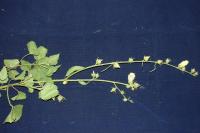
nam̃am̃a
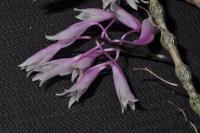
namarai
n. preserved breadfruit
bookmarknamarere
n. kind of sugarcane
bookmarknamaunirij
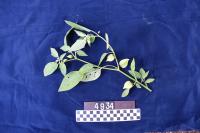
n. herb to 30 cm, fruits green. (collection: Michael J. Balick #4934)
Example: Take the leaves, squeeze out the juice in a cup of water, drink 3x daily for 3 days to treat dengue fever--use one handful of leaves in a cup of water and drink cool. The fruits are edible. Peel the outer part off and eat like a tomato.
bookmarknam̃caca
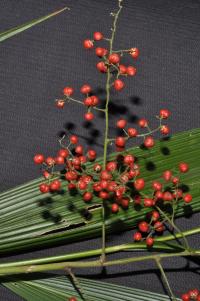
n. vine climbing in understory, growing in rainforest along river. (collection: Gregory M. Plunkett #4057)
Example: 1. This plant is named in relation to a winged fish. The leaves are rough and resemble the body the fish. 2. The leaves of this plant are used to wrap grated taro or manioc. After it is fastened with rope and boiled or baked.
bookmarknämdokai
name
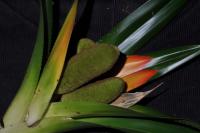
n. epiphytic liana, growing in primary forest. Bracts orange-red at base. (collection: Gregory M. Plunkett #4029)
Example: 1. The roots of this plant are used to make "Nopoy"--a traditional trap used to catch fish and lobster. The outer bark of the roots are removed and sun-dried. The roots are then split into several pieces and they are woven in an open fashion similar to a "noporapora"--a type of market basket fashioned from coconut leaflets.
bookmarkname cedo
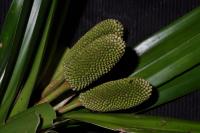
n. epiphytic liana climbing up several canopy trees, growing on slope in primary forest. (collection: Gregory M. Plunkett #4023)
Example: 1. The roots of this plant are used to make "Nopoy"--a traditional trap used to catch fish and lobster. The outer bark of the roots are removed and sun-dried. The roots are then split into several pieces and they are woven in an open fashion similar to a "noporapora"--a type of market basket fashioned from coconut leaflets.
bookmarkname cedo
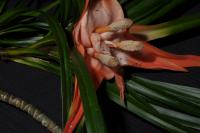
name cedo
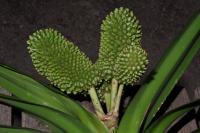
namehe
n. kind of taro
bookmarknameleahpu
n. kind of breadfruit
bookmarknamesei
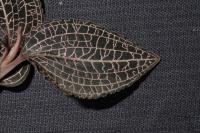
nametreyeñ
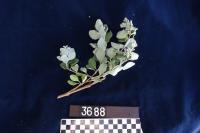
namji
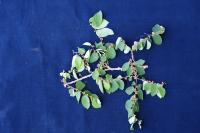
n. tree, 4 m tall (collection: Gregory M. Plunkett #3508)
Example: 1. The stems of this plant are sharpened and used to plant swamp taro or dry land taro. 2. Break small branch top put behind ear if you go to an unknown place and keep behind ear and sleep with it. If the place is safe you will sleep if it is not you will not sleep well – only behind ear when you sleep.
bookmarknamlau
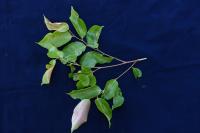
n. shrub, 2 m tall (collection: Gregory M. Plunkett #3485)
Example: 1. The larger stems of this plant can be used to build houses, for rafters. 2. It is also a good source of firewood. 3. Ancestors, before go to chief’s canal and want to talk about a complicated issue – a person would cut a branch and bring it to the sea and tap the water surface and would say what he wants, ask that he would want that issue to be solved and that others would follow his ideas and then go back to the meeting place and take stick, keep wind at his back, moving stick in all directions and then he will convince the people of his ideas. This is done by the chief’s spokesman. Helps convince the opposition. Helps keep power in hands of parent(??) chief rather than subchiefs who might have other ideas.
bookmarknamlau
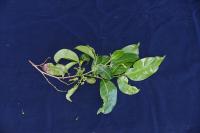
n. shrub, 2 m tall (collection: Gregory M. Plunkett #3490)
Example: 1. The larger stems of this plant can be used to build houses, for rafters. 2. It is also a good source of firewood. 3. Ancestors, before go to chief’s canal and want to talk about a complicated issue – a person would cut a branch and bring it to the sea and tap the water surface and would say what he wants, ask that he would want that issue to be solved and that others would follow his ideas and then go back to the meeting place and take stick, keep wind at his back, moving stick in all directions and then he will convince the people of his ideas. This is done by the chief’s spokesman. Helps convince the opposition. Helps keep power in hands of parent(??) chief rather than subchiefs who might have other ideas.
bookmarknamlau
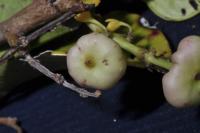
namlau
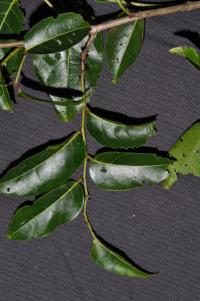
namlau
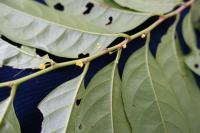
n. tree to 15 m tall, dbh 40 com (collection: Michael J. Balick #4857)
Example: The wood of this tree is good for carving. The fibers go in one direction so it is easier to carve, for example, to make a kava bowl. In general, this is the species used to make kava bowls. If your kava is not strong, then making it in this bowl will make it stronger. The kind of bowl made from this tree has a handle on each side of the bowl and it is held with 2 hands. The place name Anumwmamlau is named after this tree. There are said to be two types of this tree--one with all green leaves (this specimen) and one with white and green leaves. If a person is going to a Tabu place and is concerned about spirits, they should take a handful of these leaves and wash the body all over with it--take a swim (bath) with it. Then the person can go to the Tabu place without risk. There are other unspecified spiritual uses of this tree.
bookmarknamlau elwa
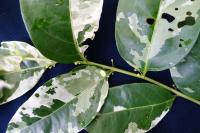
n. tree to 15 m tall, dbh 40 cm (collection: Michael J. Balick #4859)
Example: The wood of this tree is good for carving. The fibers go in one direction so it is easier to carve, for example, to make a kava bowl. In general, this is the species used to make kava bowls. If your kava is not strong, then making it in this bowl will make it stronger. The kind of bowl made from this tree has a handle on each side of the bowl and it is held with 2 hands. The place name Anumwmamlau is named after this tree. There are said to be two types of this tree--one with all green leaves (this specimen) and one with white and green leaves. If a person is going to a Tabu place and is concerned about spirits, they should take a handful of these leaves and wash the body all over with it--take a swim (bath) with it. Then the person can go to the Tabu place without risk. There are other unspecified spiritual uses of this tree. The second part of this local name "elwa" refers to the variegation of the leaves.
bookmarknamlau or nida
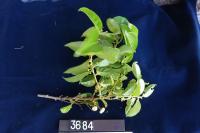
namñiañia
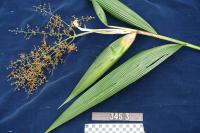
namniañia
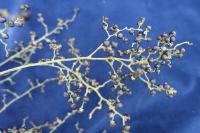
namohos
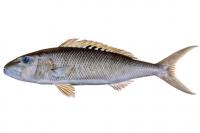
n. Green jobfish
Example: Photo by ANFC, License: CC BY-NC 3.0 via Fishes of Australia
bookmarknamop
n. kind of tree
bookmarknamotmot
n. grass; also "namutmut"
bookmarknamou
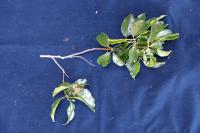
namou
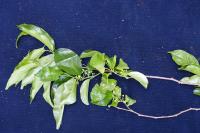
namou
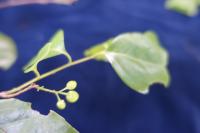
namp̃owei
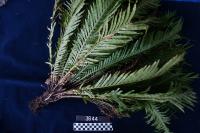
n. terrestrial fern, growing in secondary forest along the river. Fronds dimorphic. (collection: Gregory M. Plunkett #3644)
Example: This is a sacred plant, it will keep crops, such as foods, in good condition and protect people from famine and loss of crops. It grows wild along the river and people leave it there and also move the plants to the house along with Terminalia fruiticosa and other unspecified plants for use in protecting their crops. For example, when people go to the garden, they take their planting stick and place it near these plants for a while, and being near it will help protect the garden as a person then works with their planting stick to plant the garden.
bookmarknamrad
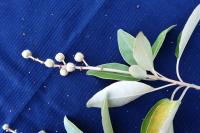
namrop̃om
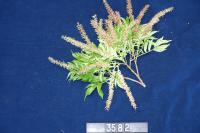
n. tree, 7-8 m tall (collection: Gregory M. Plunkett #3582)
Example: Firewood, timber good for bush houses. Calendar plant – when it is in flower, the old people know it is time to harvest root crops, like yam and other vine crops, in the wild, as yet unspecified. Local names = INYAC, NOMODEJ TAL, NOMODEJ WOU, NOU LELCEI… etc.
bookmarknamumuatamag
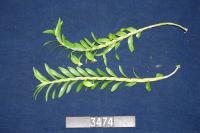
n. epiphyte on fallen tree, growing in disturbed forest. Fruit. (collection: Gregory M. Plunkett #3474)
Example: When children feel weak, this is a good medicine for them. Squeeze the leaves and give the child (3-5 years of age) one tea spoon of the juice and it is said to make them strong again.
bookmarknanad
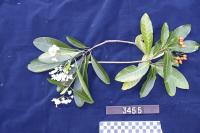
nanad
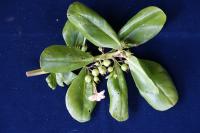
n. shrub, 1 m tall (collection: Gregory M. Plunkett #3553)
Example: 1. A stimulant plant. If a person is going to their garden early in the morning before the sun come up, break 2 top young leaves and chew and swallow the liquid, spitting out the fiber. This makes the person able to work harder and not feel tired while in the fields. It was noted that "a person can do the work of many people if they chew this." 2. The leaves are used for fertilizer for taro--put a bunch of leaves in a hole were taro is to be planted as a compost/antibiotic. This practice is said to kill all of the bad organisms such as bacttively impact the health of the taro plant. 3. This one collected from coastal area, ?? one collected in forest area. People take 4 leaves, chew leaves, swallow juice, gives energy to work hard the entire day. For fishing, take lots of ripe fruits and put in pocket, you will be able to catch a lot of fish. It brings good fortune when fishing. Roots – take one root, wash where a woman is giving birth to a newborn baby, give a drop of the juice from the root to clear the mucus in the throat.
bookmarknanad
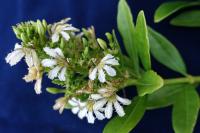
nanad
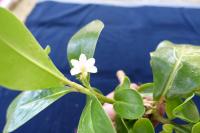
nanad
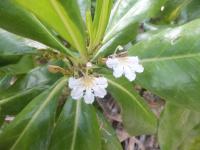
n. shrub. Growing near the beach. (collection: Ashley A McGuigan #4)
Example: 1. Dried branches from this plant can be used to roast vegetable crops that women eat if they have problems becoming pregnant. 2. Firewood, burns well. 3. Some people will eat the green fruit for protection against black magic. Eat 5 fruits for this. Eat it only once – will last for a year.
bookmarknanad cop̃ou
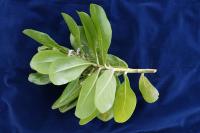
n. small shrub, 0. 5 m tall (collection: Gregory M. Plunkett #3219)
Example: 1. A stimulant plant. If a person is going to their garden early in the morning before the sun come up, break 2 top young leaves and chew and swallow the liquid, spitting out the fiber. This makes the person able to work harder and not feel tired while in the fields. It was noted that "a person can do the work of many people if they chew this." 2. The leaves are used for fertilizer for taro--put a bunch of leaves in a hole were taro is to be planted as a compost/antibiotic. This practice is said to kill all of the bad organisms such as bacttively impact the health of the taro plant. 3. This species is collected in the coastal areas, and is different from the one that looks similar to it, that grows in the forested areas. People take 4 leaves, chew leaves, swallow juice, gives energy to work hard the entire day. For fishing, take lots of ripe fruits and put in pocket, you will be able to catch a lot of fish. It brings good fortune when fishing. Roots – take one root, wash where a woman is giving birth to a newborn baby, give a drop of the juice from the root to clear the mucus in the throat.
bookmarknanad itohou
![1. The leaves of this plant are used as a fertilizer when a person plants taro "to help to feed the ground for next year." 2. Sapwood of this tree, and one more [GMP 3591], in old days take from west side and cross mountain to the east, and on red clay mountain, burn it to make spirits to give more sun instead of rain so that gardens will grow well.](/media/aneityum/pix/GMP_3456_MJB_43-scaled.jpg)
n. shrub, 2 m tall (collection: Gregory M. Plunkett #3456)
Example: 1. The leaves of this plant are used as a fertilizer when a person plants taro "to help to feed the ground for next year." 2. Sapwood of this tree, and one more [GMP 3591], in old days take from west side and cross mountain to the east, and on red clay mountain, burn it to make spirits to give more sun instead of rain so that gardens will grow well.
bookmarknanad op̃a
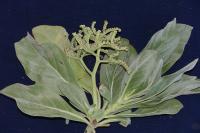
n. tree, 4-5 m tall (collection: Gregory M. Plunkett #3542)
Example: Some people use the dried leaves of this plant when there is no tobacco. Roll the leaves and smoke them. This is a good plant to lay under as a shade along the coast. Good firewood. The leaves are used with other leaves as part of a ceremony to calm the sea.* Burn leaves in a special place and toss ashes in the sea – sea will be calm.* When you are paddling to another island. Carry them with you and toss in sea as you go. Also goes with fasting and cleansing when traveling in this way.
bookmarknanec
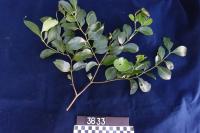
n. tree, 7 m tall (collection: Gregory M. Plunkett #3633)
Example: To cook Alocasia (wild taro), use the dry wood of this plant as firewood. The leaves of this plant are also used to line the earth oven on top of the food and on bottom of the food to insulate it from the high heat of cooking.
bookmarknanedauyan
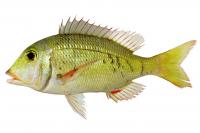
n. Pacific yellowtail emperor
Example: Photo by Jeffrey T. Williams / Smithsonian Institution, License: CC BY-SA 3.0 via Fishes of Australia
bookmarknanini
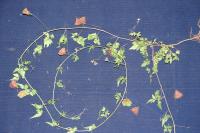
naop yi atmas
n. a small whirlwind
bookmarknapaecei
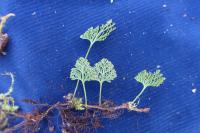
napaeicei
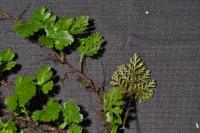
napalhat
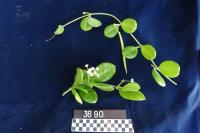
n. vine, growing on rocks at end of strand near coastal forest. (collection: Gregory M. Plunkett #3690)
Example: As a medicine to treat toothache, the latex from this vine is put into the tooth as soon as the person feels pain. Use 3x daily until the pain has subsided. The flower is used as a decoration behind the ear. When there are rough seas because someone has trespassed in a tabu area you can take 12 leaves from the napalhat and put them in a pond for about 1 week until they start to stink. Then use we leaves from the naojapdak and drown those leaves in either a fresh water pond or salty water. (No further information given). Can also take an armful of napalhat and place on top of a stone in the tabu area with a smaller stone on top of the napaphat. The stone must be a large permanent stone. Has also heard people say it can be used for toothache if you put the leaf on the tooth.
bookmarknapannopotan
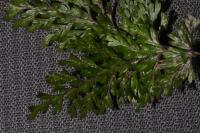
napapotan
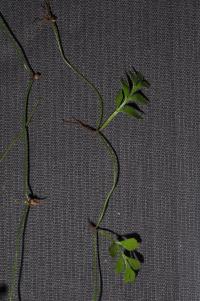
naparap
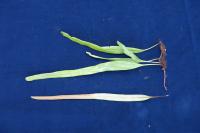
n. epiphytic fern on main tree trunk, growing in dry forest. (collection: Gregory M. Plunkett #3504)
Example: This is a medicine to treat fresh cuts. Take the leaf of this species, macerate it and add 1 tablespoon of water and wrap in a Macaranga leaf, and then heat it on a fire. After heating, puncture the side of the Macaranga leaf and drop the hot juice on the fresh cut. This is said to be good before going to see the Dispensary or if you do not have access to a health care professional.
bookmark